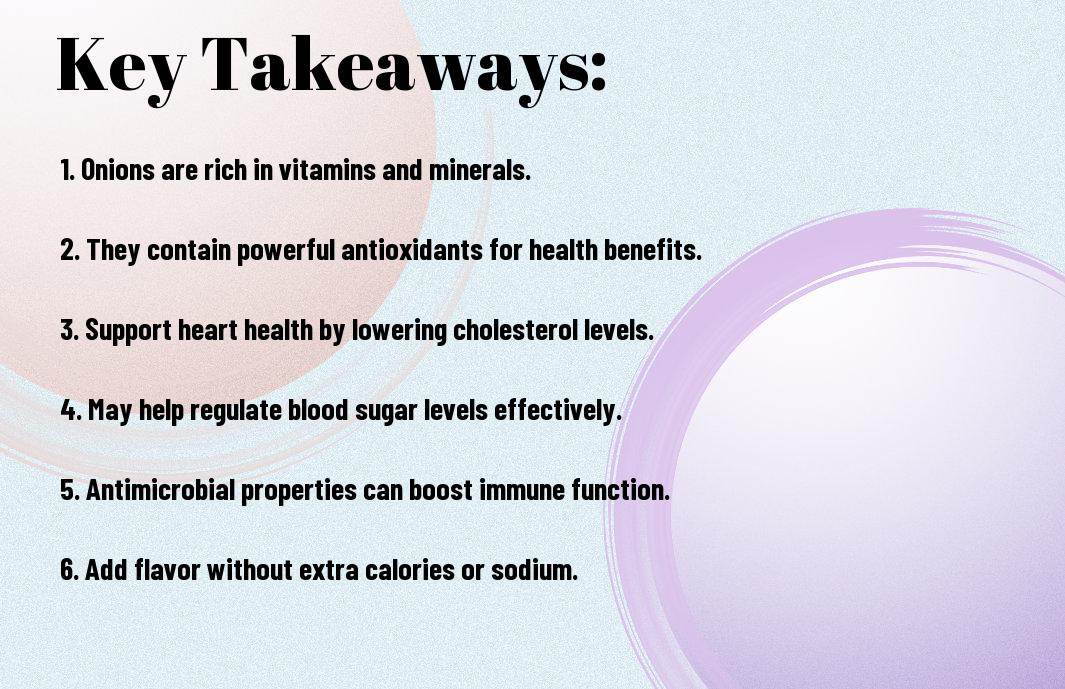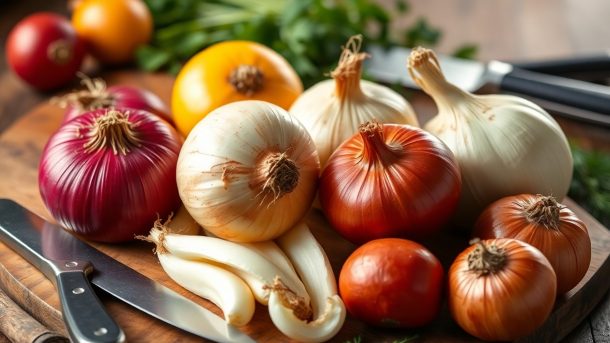Over the years, you’ve probably wondered about the health benefits of onions. This versatile vegetable is not only a staple in many dishes, but it also offers numerous nutritional advantages that can enhance your well-being. Packed with vitamins, minerals, and antioxidants, onions can contribute to your overall health when included in your diet. In this post, we’ll explore the various ways onions can benefit you and why they deserve a spot in your meals.
Key Takeaways:
- Rich in Nutrients: Onions are loaded with vitamins and minerals such as vitamin C, vitamin B6, and potassium, contributing to overall health.
- Antioxidant Properties: They contain antioxidants, including quercetin, which can help reduce inflammation and protect cells from damage.
- Heart Health: Consuming onions may support heart health by improving cholesterol levels and lowering blood pressure, thereby reducing the risk of cardiovascular disease.
Nutritional Profile of Onions
For your overall health, onions provide a rich array of nutrients. They are low in calories yet packed with vitamins, minerals, and antioxidants, contributing to various health benefits. A typical onion contains small amounts of fiber, vitamin C, vitamin B6, and folate, making it a versatile ingredient in your diet that can enhance the nutritional value of your meals.
Vitamins and Minerals
Nutritional content in onions includes necessary vitamins and minerals such as vitamin C, which supports your immune system, and folate, known for its role in cell division and overall health. In addition, onions provide potassium, which assists in regulating blood pressure and maintaining proper muscle function, making them a beneficial addition to your diet.
Antioxidants
Nutritional benefits of onions extend to their rich antioxidant content, which helps protect your cells from damage caused by free radicals. Onions contain flavonoids, particularly quercetin, which exhibit anti-inflammatory properties and may contribute to heart health. Including onions in your meals can enhance your antioxidant intake, further supporting your well-being.
For instance, studies have shown that quercetin can help reduce blood pressure and inflammation, making onions a heart-friendly food choice. Additionally, the antioxidants in onions may play a role in lowering the risk of chronic diseases, such as diabetes and certain types of cancer. By incorporating onions into your diet, you can significantly boost your intake of beneficial compounds that support your long-term health.


Health Benefits of Onions
It’s no secret that onions are packed with nutrients and offer various health benefits. Rich in vitamins, minerals, and antioxidants, they contribute to improved immune function, digestive health, and can even aid in respiratory issues. Incorporating onions into your diet can enhance overall well-being and help you prevent chronic diseases, making them a worthwhile addition to your meals.
Heart Health
Between the numerous studies conducted, it’s evident that onions can support heart health. Their high content of antioxidants, particularly quercetin, may help reduce inflammation and lower blood pressure, ultimately leading to a decreased risk of heart disease. By including onions in your diet, you are actively promoting a healthier heart.
Anti-inflammatory Properties
Between the various compounds found in onions, the anti-inflammatory properties stand out. These compounds can help combat chronic inflammation in your body, which is linked to various health issues, including heart disease, diabetes, and certain cancers.
This natural anti-inflammatory effect may be attributed to sulfur compounds and flavonoids present in onions. Regularly consuming onions can help reduce markers of inflammation, promoting better overall health. By adding onions to your daily meals, you can harness their potential to fight inflammation and support your body’s natural defenses.
Onions and Digestive Health
Your digestive health can benefit significantly from incorporating onions into your diet. Rich in vitamins, minerals, and antioxidants, onions may help improve gut function, support regular bowel movements, and enhance the overall health of your digestive system. Including onions in your meals can contribute to a happier, healthier gut.
Dietary Fiber
With their impressive dietary fiber content, onions assist in maintaining a healthy digestive tract. Fiber is necessary for promoting regular bowel movements and preventing constipation. By consuming onions, you add a flavorful source of fiber that aids in digestion, allowing your body to process foods more efficiently.
Prebiotics
Around 80% of your immune system resides in your gut, making it necessary to nurture your digestive health with prebiotic foods, such as onions. These plant-based compounds serve as food for beneficial gut bacteria, promoting a balanced microbiome. A healthy microbiome enhances digestion, boosts immunity, and reduces inflammation, contributing to your overall well-being.
Prebiotics play a vital role in supporting the growth and activity of beneficial gut bacteria, which are necessary for optimal digestive health. When you consume onions, the prebiotic fibers they contain can stimulate the growth of good bacteria like bifidobacteria and lactobacilli. By enhancing the diversity and abundance of these microorganisms, onions help create a healthier gut environment that supports digestion and aids in nutrient absorption.
Potential Risks and Allergies
Not everyone can enjoy onions without concern. Some individuals may experience digestive issues or allergic reactions when consuming onions, which can lead to discomfort. Symptoms such as itching, swelling, or gastrointestinal distress can indicate an intolerance or allergy. Pay attention to your body’s reactions when including onions in your diet to ensure they contribute positively to your health.
Food Sensitivities
At times, you may find that certain foods, including onions, do not sit well with your digestive system. If you experience bloating, gas, or stomach upset after eating onions, it could be a sign of food sensitivity. Consider tracking your symptoms and discussing them with a healthcare professional to determine the best dietary approach for you.
Interaction with Medications
An awareness of how onions might interact with your medications is crucial for maintaining your health. Onions may influence the effectiveness of certain medications, particularly blood thinners like warfarin. If you’re on such medications, consult your healthcare provider for personalized guidance on onion consumption while taking them.
A thorough understanding of potential interactions will help you manage your health effectively. Onions contain compounds that can impact blood clotting, which means you should keep your doctor informed about your intake. This will help you maintain a safe balance while benefiting from the nutrients onions offer. Always prioritize open communication with your healthcare team when introducing any dietary changes, particularly if you’re on medication.
Culinary Uses of Onions
To enhance your culinary creations, onions serve as a foundational ingredient in many dishes worldwide. From soups and stews to salads and sandwiches, the unique properties of onions allow them to add depth and character to various cuisines. You can enjoy them raw in salads for a zesty kick or sautéed to unlock their natural sweetness, demonstrating their rich range of flavor profiles.
Flavor Enhancer
After discovering the array of flavors onions provide, you’ll find they are much more than a simple ingredient. Their ability to meld with other flavors makes them an indispensable element in cooking. You can use onions to introduce mild sweetness or a savory umami depth, transforming a basic dish into a gourmet experience.
Versatility in Cooking
Culinary applications of onions are virtually limitless, allowing you to experiment across various cooking methods. From caramelizing and roasting to pickling and grilling, you can incorporate onions into countless dishes that cater to your taste preferences. Their adaptability makes them suitable for both quick meals and elaborate recipes, ensuring that you can effortlessly elevate any meal.
Flavor combinations can be exciting when you use onions, whether you choose sweet varieties like Vidalia or robust types like red onions. You can toss them into stir-fries, braise them with meats, or even caramelize them for a rich topping. Adjusting how you incorporate onions allows you to discover new textures and flavors, showcasing your culinary skills in every kitchen endeavor.
Conclusion
Drawing together the information on onions, you can appreciate their numerous health benefits, including their rich antioxidant content and anti-inflammatory properties. Incorporating onions into your diet can enhance your overall well-being, providing imperative nutrients that support your immune system and heart health. For a deeper understanding of onions’ nutritional value and health advantages, you can explore more in this article on Are Onions Good for You? Health Benefits & Nutrition Facts.
FAQ
Q: Are onions healthy to eat?
A: Yes, onions are considered very healthy as they are low in calories but packed with nutrients. They contain vitamins such as vitamin C, B vitamins (including folate), and minerals like potassium. Additionally, they are rich in dietary fiber and antioxidants, which can contribute to overall health.
Q: What are the health benefits of consuming onions?
A: Onions offer several health benefits, including anti-inflammatory properties, improved heart health, and potential cancer-fighting qualities. Their antioxidants may help protect cells from damage, and compounds like quercetin can reduce blood pressure and lower cholesterol levels, promoting cardiovascular health.
Q: Can onions help with digestive health?
A: Yes, onions can aid in digestive health because they are a good source of fiber, particularly inulin, which acts as a prebiotic. This means they support the growth of beneficial gut bacteria, which can enhance digestion and overall gut health.
Q: Are there any downsides to eating onions?
A: While onions are generally healthy for most people, some individuals may experience digestive discomfort, such as gas or bloating, due to their high fiber content and certain sugars. Additionally, those with sulfur allergies or certain gastrointestinal conditions may want to limit their intake.
Q: How can I incorporate onions into my diet?
A: There are many ways to include onions in your diet. They can be eaten raw in salads, grilled, roasted, or sautéed in various dishes. Onions can enhance the flavor of soups, stews, and sauces, making them a versatile ingredient in both cooking and meal prep.



